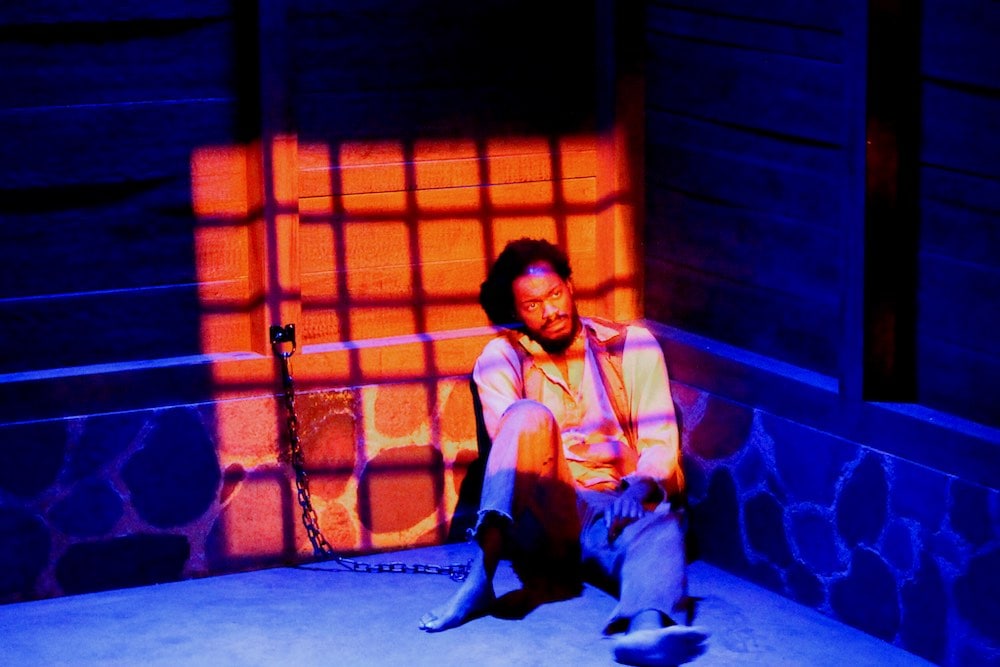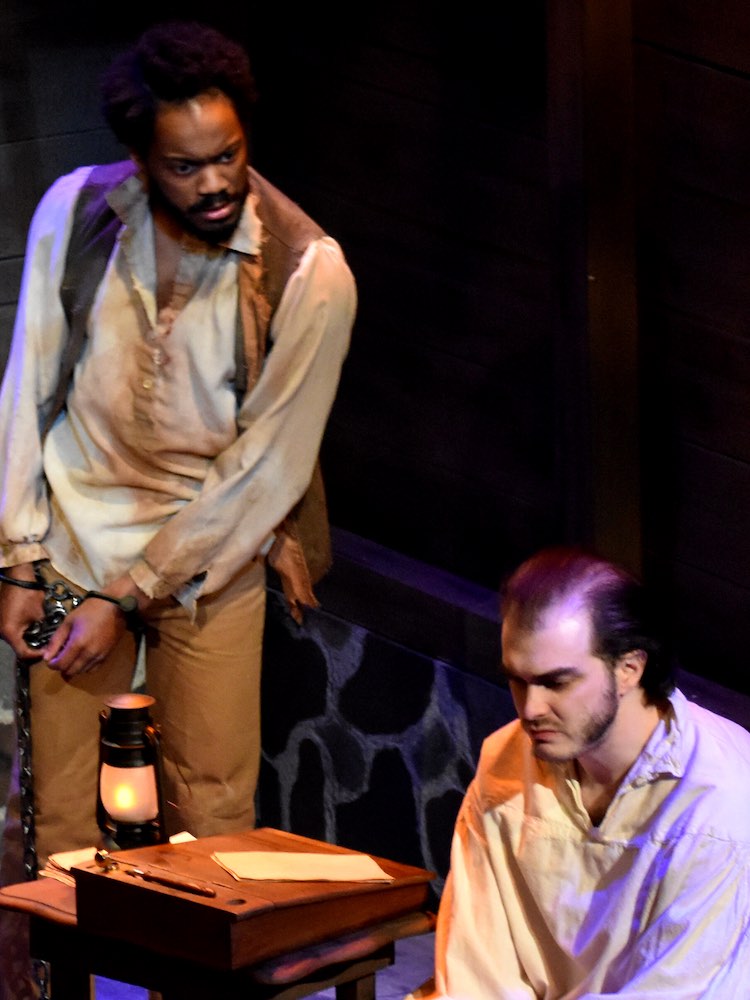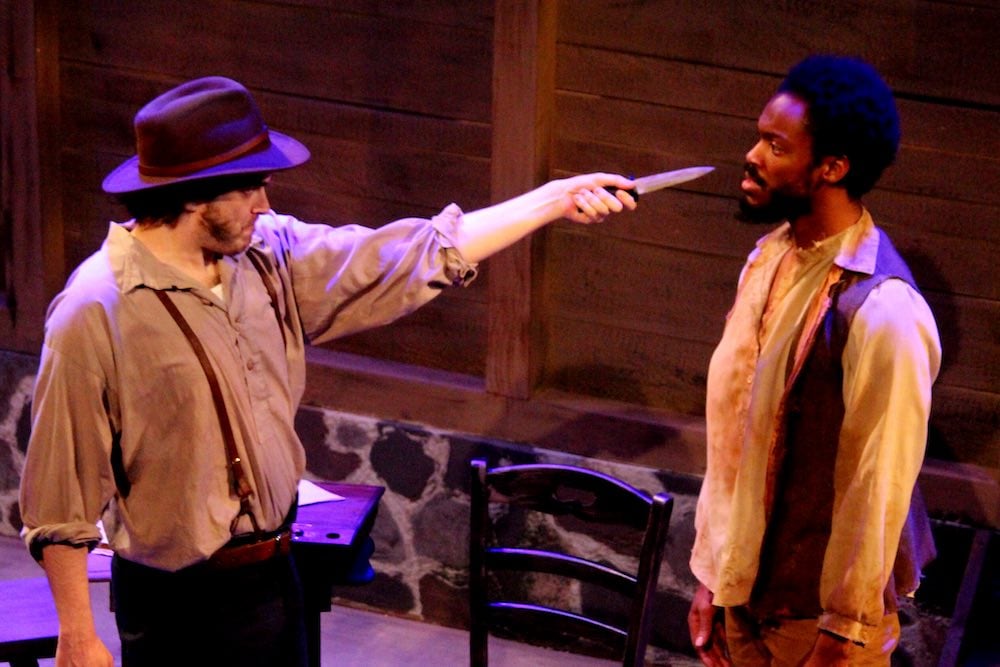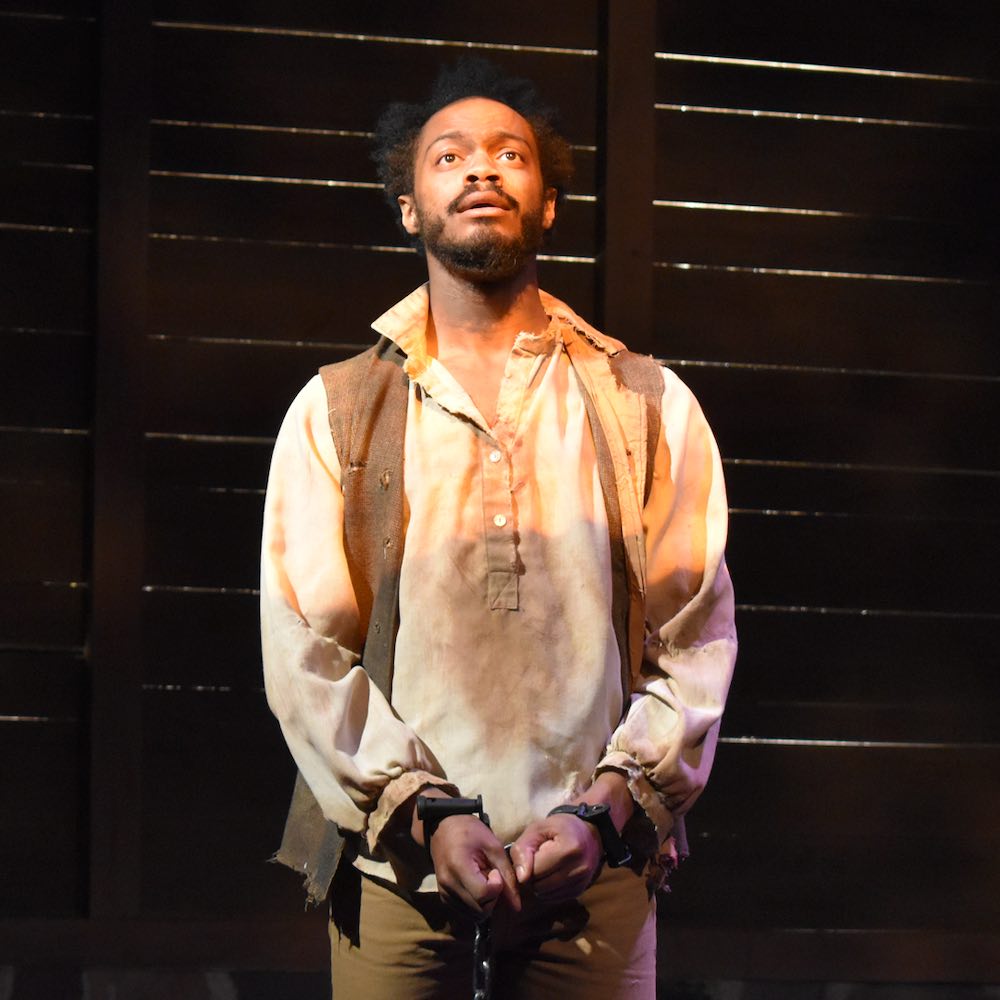What does holy vengeance look like?
Can bloody vengeance ever be truly holy? Even in response to the monstrous crime of American chattel slavery? Even as it involves the slaughter of young children in their beds? These are the kinds of questions raised in Nathan Alan Davis’s Nat Turner in Jerusalem, now playing at NextStop Theatre in Herndon.

What is known as the “Nat Turner Rebellion” is probably the most famous, though not the largest, revolt of enslaved people in American history. In southeastern Virginia in 1831, Turner and his followers killed 55 to 60 white people, principally enslavers and their families. Militias put down the rebellion. Turner was captured after two months in hiding, taken to Jerusalem (now Courtland), Virginia, and hanged. Upwards of 200 Black people were killed by whites in the aftermath of the rebellion.
The question of holiness arises because Turner, an impassioned Christian believer and preacher, acted, in Davis’s telling, in response to the visions he experienced of God’s message to him. While, in historian Henry Louis Gates, Jr.’s view, the rebellion had “no clear goals,” Turner appears to have believed that killing large numbers of whites would serve God’s purposes by starkly showing the reality of the brutality of enslavement. Turner reportedly said later that he wanted to spread “terror and alarm” among whites.
In the play, Turner is spending his last night in jail before being hanged, reflecting on the last sunset he will see. He is chained in a corner of the high-walled plank cell of Evan Hoffman’s set design. Hailey LaRue’s lighting design emphasizes degrees of darkness, emotional as well as physical, with the grid pattern of sunset or moonlight cast into the cell, and dim illumination represented by a whale oil lantern that sometimes goes out.
As played by Kevin Thorne in a performance of contained power, Turner is composed, unyielding, certain of his beliefs and righteousness, intensely intelligent, and not at all inclined to pander to the wishes of his white interlocutor, Thomas Gray. Even in moments of stillness and quiet, Thorne commands the stage.

The historical Thomas Gray, a lawyer, interviewed Turner, resulting in a 23-page pamphlet, The Confessions of Nat Turner, claiming to be Turner’s verbatim account of the rebellion and his motives for it. Given the sensational nature of the events, it became something of a best-seller in its day, as well as the major source for subsequent treatments of the Turner story, including William Styron’s controversial 1967 novel of the same title and Nate Parker’s 2016 film, The Birth of a Nation.
In the play Nat Turner in Jerusalem, Gray returns a few days after his initial interviews seeking additional information from Turner, believing that if Turner will admit to knowledge of wider conspiracies, this will increase the commercial appeal of his pamphlet. In Bobby Libby’s characterization, Gray is variously aggressive, fearful, suspicious, given to self-pity, craving the financial success that has eluded him, and lacking the belief in God that is Turner’s lodestar. His other signal lack is empathy.
The play’s third character, a jailer, also played by Libby, enters periodically. A lower-class character, he has, his casual racism notwithstanding, a greater degree of fellow-feeling for the condemned man. Turner cons

equently shows greater respect for him than for the more educated Gray. Having lost everything and everyone in his life, Turner asks of the jailer only that he be present at the execution. Libby does well at distinguishing the voice, accent, and physicality of his two characters.
Costume changes between Libby’s two characters lead to occasional pauses, leading me to wonder why different actors weren’t cast for the roles. The double-casting is a feature of Davis’s script, not a choice by director Bryanda Minix. Is it intended to suggest that the characters are simply different manifestations of an overall unitary experience of whites that Blacks of Turner’s era would have had? In any event, Minix’s direction maintains momentum in what could otherwise be a static presentation.
The play is static in two senses. One is that it takes place in the confined space of a jail cell. A second is that all three characters are the same at the end of the play as at the beginning. No character arcs here; no one changes, no one is transformed from who they are when we first see them. That said, there are some individual lines that resonate — “This was not war…this was warning” — and some lyric passages of real beauty, such as a prayer in which Turner leads the agnostic Gray.

So in this play we see someone who believes, with all his passionate heart and brilliant mind, that God demands he take violent action to bring death and terror to evildoers and their kin. What distinguishes Nat Turner’s godly motivations from those of present-day violent jihadis? Do the individual lives taken matter? Do the numbers involved matter? Does humanity, or God for that matter, look differently at killing 50 or 60 people in vengeance versus the vast numbers killed by enslavers in search of profit? Are murders sanctified by one’s holy purpose in committing them? It is to Davis’s credit that he has written a play that raises important questions, while not attempting to dispense answers to the audience.
Running Time: 90 minutes with no intermission.
Nat Turner in Jerusalem plays through April 17, 2022, at NextStop Theatre Company’s Industrial Strength Theatre, 269 Sunset Park Drive, Herndon, VA. Tickets ($30) are available for purchase online.
COVID Safety: All patrons must be fully vaccinated and wear a mask to attend performances. NextStop’s COVID Patron Safety Policies are here.
Nat Turner in Jerusalem
By Nathan Alan Davis
Cast
Kevin Thorne as Nat Turner
Bobby Libby as Thomas Gray
Production Team
Directed by Bryanda Minix
Scenic Design by Evan Hoffmann
Costume Design by Imari Pyles
Lighting Design by Hailey LaRoe
Stage Managed by Shee Shee Jin
SEE ALSO:
NextStop Theatre slates five shows for winter/spring 2022 (season announcement)




